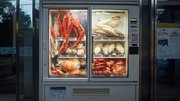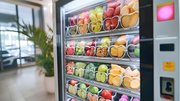News
NAMA Hails Members Support In Commenting On DOE Vending Machine Rule Terms Standards Unattainable
November 19, 2015 | Nick Montano
TAGS: vending, vending machine, National Automatic Merchandising Association, U.S. Department of Energy, vending energy conservation standards, beverage vending machines, Mike Kelley, Eric Dell, Energy Star, CO2-based refrigeration |
CHICAGO -- The National Automatic Merchandising Association hailed its membership for exhibiting "record grassroots engagement" by submitting more than 1,000 comments to the U.S. Department of Energy regarding its proposed rule on energy conservation standards for beverage vending machines.
Some 1,045 industry members submitted comments to the DOE. Participants represented 40 states and every segment of the refreshment services industry. NAMA reported that its Emerging Leaders Network helped spread the word, with a special call to action from ELN chairman Mike Kelley, Quality Brokerage (Turnersville, NJ).
"NAMA's entire government affairs team is humbled by the continued increase of industry involvement in grassroots advocacy," said NAMA senior vice-president of government affairs Eric Dell. "NAMA's message is clear: officials at the Department of Energy should understand how important it is that their proposed standard be modified to reflect reasonable, attainable energy conservation standards for beverage vending machines."
DOE's proposed rule would require an unattainable reduction in energy consumption in vending machines selling refrigerated beverages, including combination cold drink and snack combos, by 2019, Dell said.
Dell explained that, NAMA is coordinating industry opposition to the DOE's proposed energy conservation standard that the rule would implement because it is not feasible from the standpoint of contemporary technology, nor is it economically justified because it would impose an unnecessary burden on an industry comprised largely of small businesses already working to meet other EPA mandates and comply with new DOE testing procedures.
Moreover, NAMA pointed out, the standards propose a definition of "combination vending machine" that is not consistent with industry practice and has not been tested to the proposed standard.
If adopted, the proposed criterion would supplant the current Energy Star specification as the "most efficient" standard, causing confusion and compromising the credibility of Energy Star in the industry. Moreover, the association charged, "the DOE has not provided the industry or consumers with proof to substantiate their claim that beverage machines using carbon dioxide that meet the proposed standard levels are already available."
(Editor's Note: CO2 can be an attractive refrigerant gas for large installations, but CO2-based refrigeration equipment to date has been more costly than conventional refrigeration systems, because it may require higher pressure and so involve added mechanical complexity.)
Therefore, NAMA is asking that DOE revisit this proposal by working more closely with industry leaders to revise the standard to something "attainable and reasonable" that would take effect no earlier than 2022.
 ChatGPT
ChatGPT Grok
Grok Perplexity
Perplexity Claude
Claude






